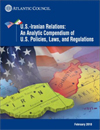Iran: Grant-Funded Projects
After more than three decades, U.S.-Iran relations continue to be governed by mistrust and hostility. USIP is working on multiple tracks to encourage dialogue and peaceful negotiations in this volatile situation.
USIP grants have funded several recent projects on Iran, including:
- U.S.- Iran Relations: An Analytic Compendium of U.S. Policies, Laws, and Regulations
Through a USIP funded grant to the Atlantic Council, Middle East scholar Dr. Kenneth Katzman produced a detailed compendium of U.S. policies, laws, and regulations that, for the past few decades, have defined U.S. relations with Iran. - Iran's Heavenly Chorus: The Political Elite of a Theocratic State
In a study made possible through a USIP grant, Syracuse University professor Mehrzad Boroujerdi is compiling a database with detailed information on nearly 2,000 people in the political elite of Iran.
U.S.- Iran Relations: An Analytic Compendium of U.S. Policies, Laws, and Regulations
Kenneth Katzman
As the ongoing effort by the U.S. and it allies to apply more targeted sanctions on Iran clearly suggests, U.S.-Iranian relations continue to be characterized by distrust and hostility. Nevertheless, at any point there may be new opportunities for more productive engagement between the two countries. To pursue such opportunities, officials must first understand the complex set of sanctions, travel restrictions, commercial and military trade embargoes and other legal instruments that govern U.S. relations with Iran.
This project has resulted in a compendium of U.S. policies, laws and regulations on Iran as well as relevant U.N. resolutions, focusing particular attention on instruments emerging subsequent to the 9/11 attacks. In addition to the full text of the documents, the compendium includes analysis of the background, context, and purposes of the laws, regulations and policies as well as offers ways to address them. The initiative seeks to provide a comprehensive and practical resource and tool for understanding the legal and regulatory framework within which U.S. policy toward Iran functions. The compendium has been disseminated among a broad range of U.S. government departments and agencies, particularly those which will have responsibility for implementing future policies related to Iran, and among scholars, policy analysts and those in the private sector with interest in U.S.-Iranian relations.
Read more about Kenneth Katzman's Compendium | Download a PDF of the compendium (PDF/1.3MB) | Addendum
Iran's Heavenly Chorus: The Political Elite of a Theocratic State
Mehrzad Boroujerdi
 Despite Iran's increasing importance in global politics, knowledge about its political elite remains skeletal. Nearly three decades after the clergy became the state’s rulers, there has been no large-scale empirical study examining the recruitment, composition and circulation of the political elite in post-revolutionary Iran. In this study conducted with USIP funding, Mehrzad Boroujerdi, associate professor of political science at Syracuse University's Maxwell School of Citizenship and Public Affairs, is compiling a database with detailed information on nearly 2,000 members of Iran’s political elite--from cabinet and parliament members to religious authorities, military officers, members of the judiciary and presidential advisers- to analyze important social and political dynamics in post-revolutionary Iran.
Despite Iran's increasing importance in global politics, knowledge about its political elite remains skeletal. Nearly three decades after the clergy became the state’s rulers, there has been no large-scale empirical study examining the recruitment, composition and circulation of the political elite in post-revolutionary Iran. In this study conducted with USIP funding, Mehrzad Boroujerdi, associate professor of political science at Syracuse University's Maxwell School of Citizenship and Public Affairs, is compiling a database with detailed information on nearly 2,000 members of Iran’s political elite--from cabinet and parliament members to religious authorities, military officers, members of the judiciary and presidential advisers- to analyze important social and political dynamics in post-revolutionary Iran.
The project will illuminate key characteristics of and trends in elite formation and help policymakers articulate more effective policies toward Iran. The study will result in a journal article and a book that analyzes the anatomy of the Iranian political system and its elite. The book will provide a comprehensive and readable account of Iran's power elite that can enrich the relevant debates in Western political capitals and inform political observers, journalists, academics, students, and the public about an important but opaque political system.
Read about Mehrzad Boroujerdi's presentation of his project at the Wilson Center on March 18, 2010
Explore
- Apply for USIP's Annual Grant Competition
The deadline is October 1, 2010. - Apply for USIP's Priority Grant Competition
The deadline for this competition is rolling. - Search for all USIP funded grants on Iran
- Learn more about Grant and Fellowship programs at USIP
